DEPARTMENT OF CIVIL ENGINEERING
Department at a Glance
Intake
60
Faculty : Student - 1:15
Physical Labs - 9
M.Tech. Structures
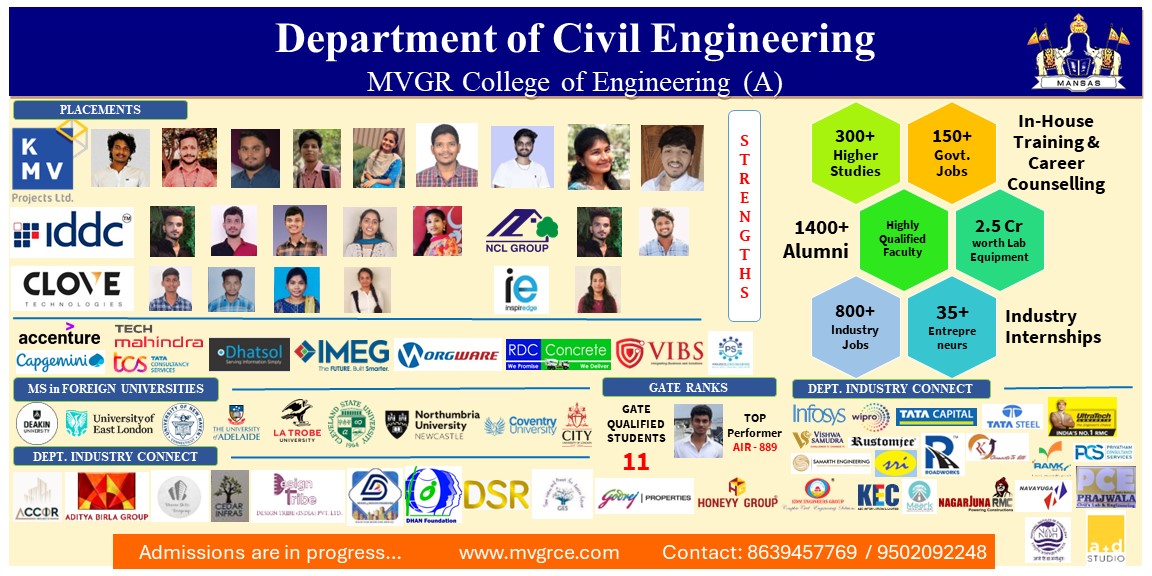
Message from the head of the department
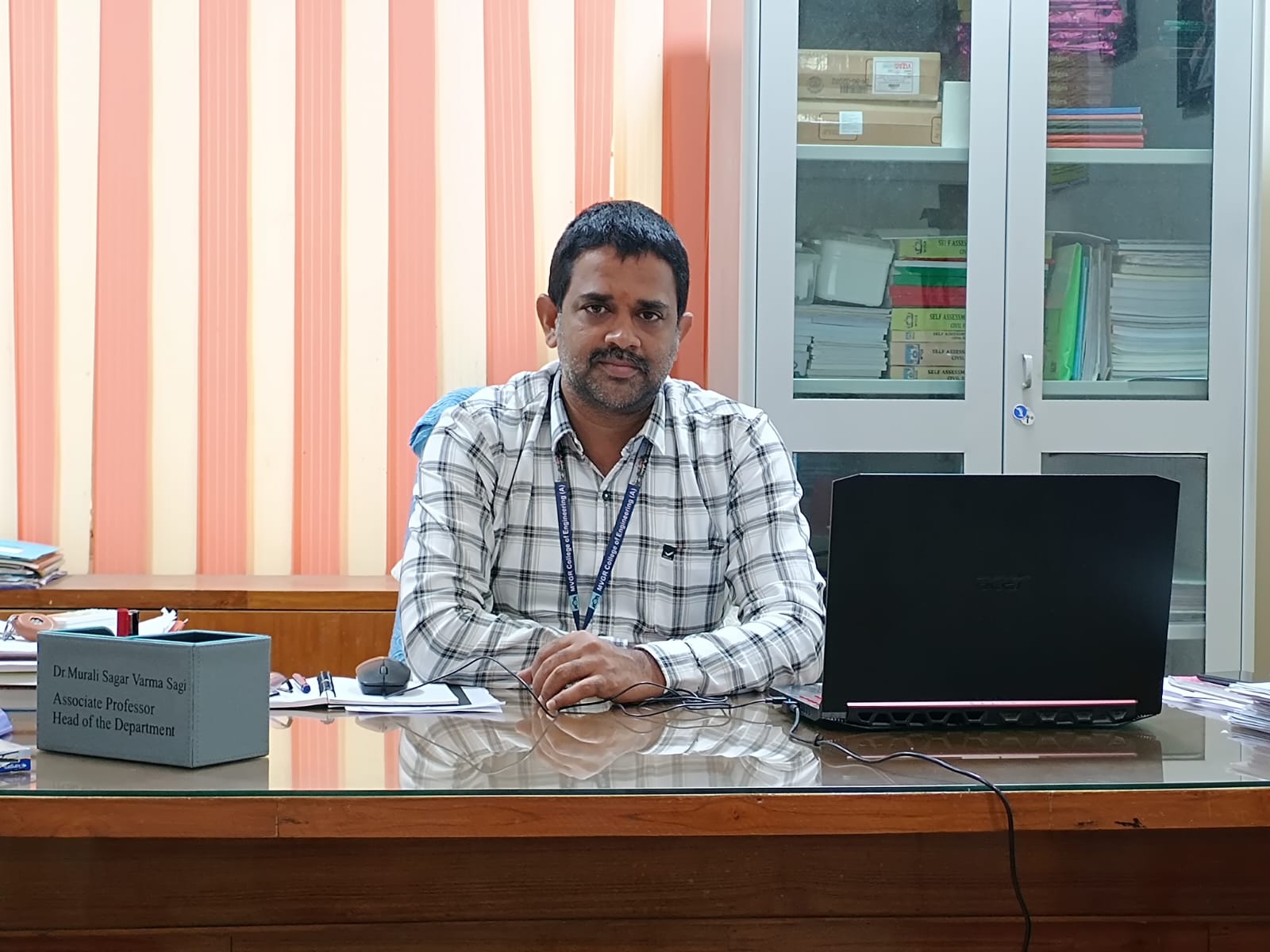
Gallery
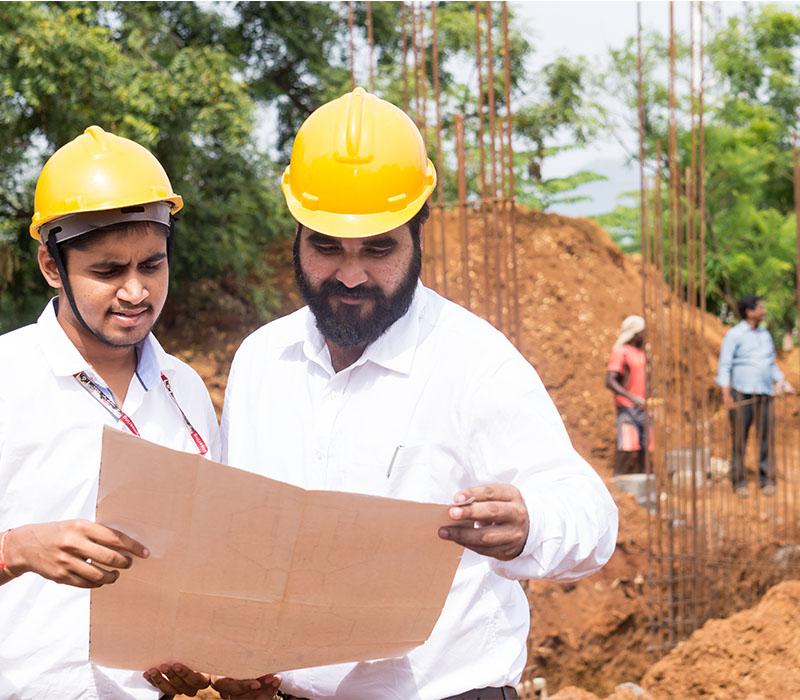

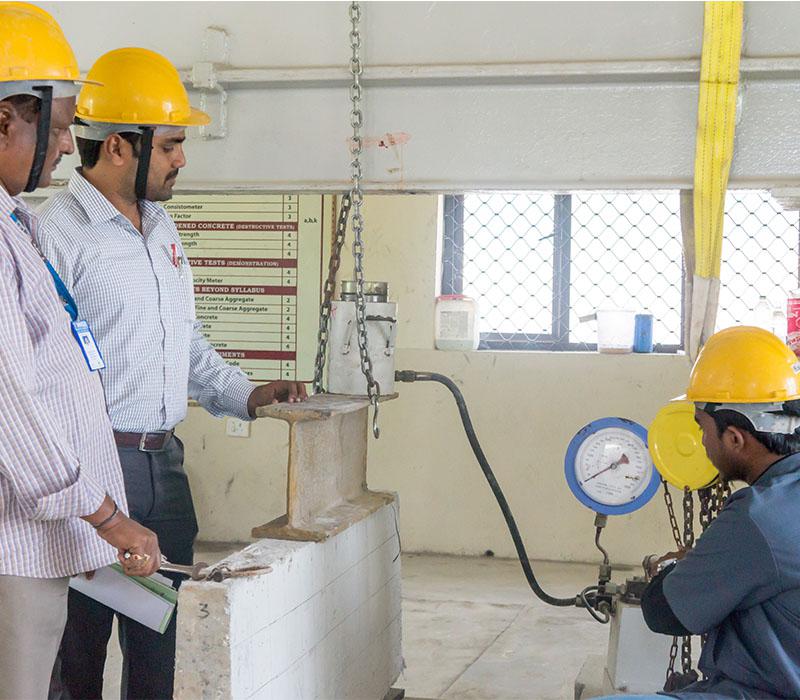
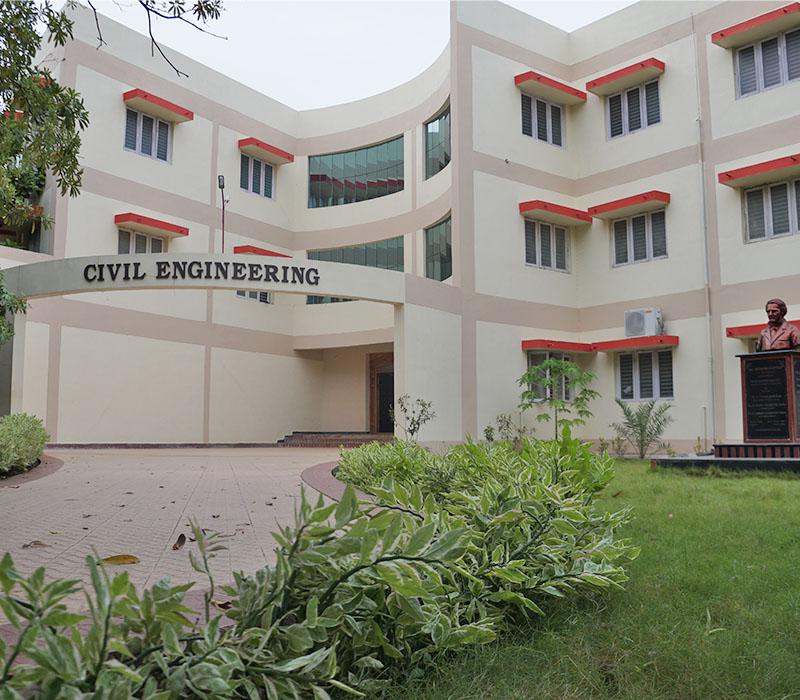
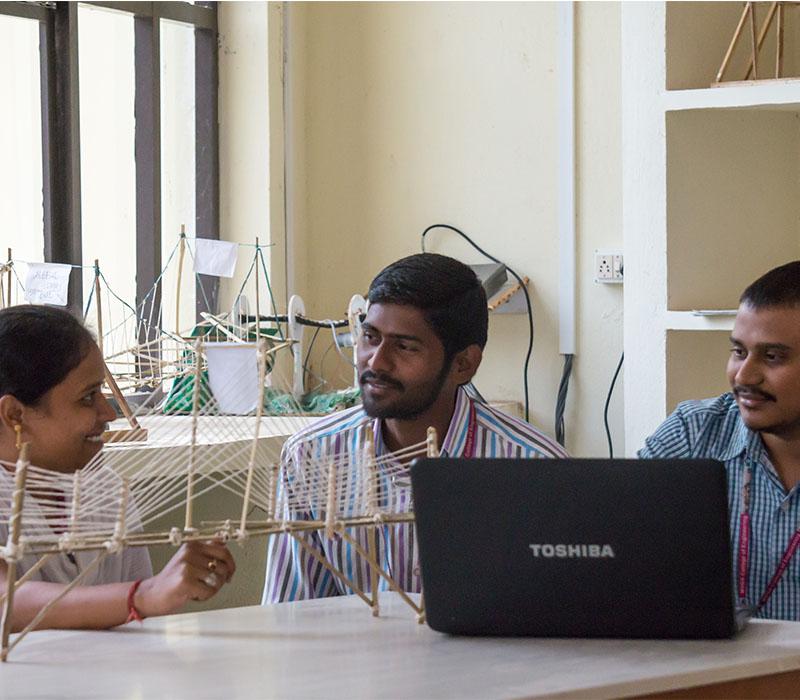
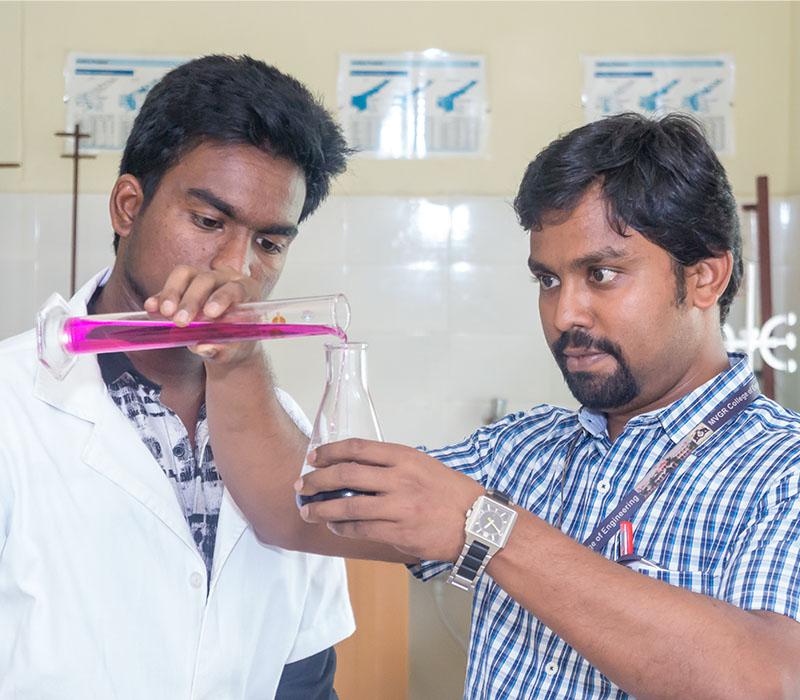
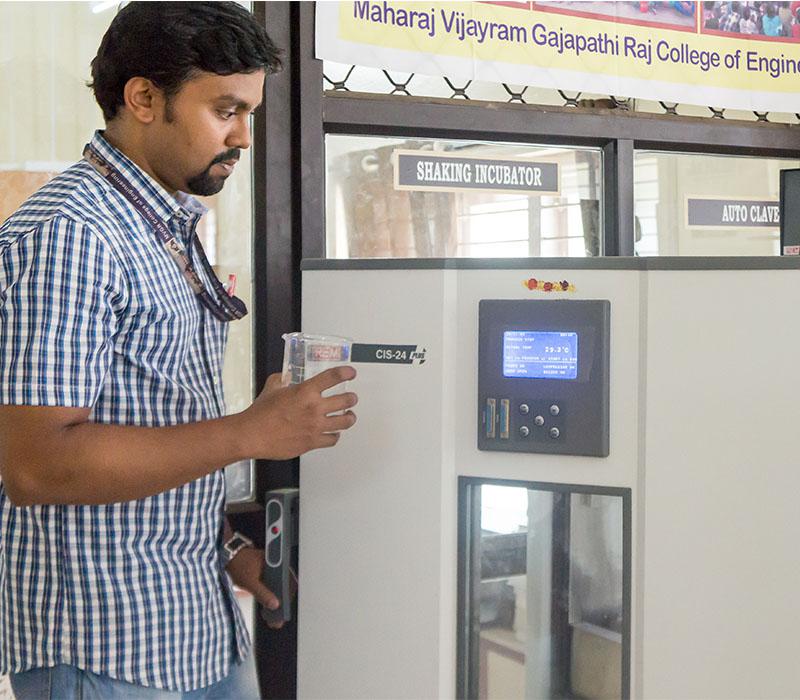
Courses Offered
Course Offered | Specialization | Intake |
|---|---|---|
B.Tech | Civil Engineering | 60 |
M.Tech | Structural Engineering | 18 |
Professional Memberships
To become a pre-eminent Department of Civil Engineering that brings out technically competent, ethically sound and globally employable professionals capable of addressing societal challenges by providing sustainable solutions.
Mission of Department:Aspire to reach higher quality benchmarks in training students on all skills expected of a civil engineering professional through a meticulously planned yet flexible learning process administered through the following:
M1. Design and develop curriculum for UG and PG programs of Civil Engineering that adds value to student competencies abreast with changing industry needs.
M2. Impart students with knowledge of Civil Engineering and use of modern tools and provide the best learning resources.
M3. Provide an enabling environment to equip students to serve the society as leading professionals, academicians, innovators and entrepreneurs.
M4. Promote and undertake academic research to address societal challenges.
M5. Provide testing and design consulting services to the industry and create Industry-Academia synergy for improving employability of students.
Program Educational Objectives (PEOs):
PEO 1: DOMAIN KNOWLEDGE: Graduates will have the fundamental knowledge of mathematics, science, economics and computing and in-depth knowledge in Civil Engineering concepts through theoretical, laboratory and project-based experiences so as to design, develop and solve engineering problems.
PEO 2: EMPLOYMENT: Graduates will get employed in national and international; government and private organizations, and will succeed in their chosen engineering careers through their skills, knowledge, personality and aptitude for innovation.
PEO 3: HIGHER STUDIES & LIFELONG EDUCATION: Graduates will pursue advanced degrees in engineering and other fields; and will have skills of continued, independent and life-long learning to become experts in their profession by self-instilled passion and systematic approach.
PEO 4: PROFESSIONAL CITIZENSHIP: Graduates will organize and present information, write and speak well, work effectively with strong organizational skills in multidisciplinary teams on team-based engineering projects and practice ethics and have a sense of social responsibility.
PEO 5: MODERN TOOLS: Graduates will plan, design, execute, maintain and rehabilitate civil engineering structures / systems and solve civil engineering problems using analytical methods or modern tools and techniques.
Program Outcomes:
1. Engineering knowledge: Apply the knowledge of mathematics, science, engineering fundamentals, and an engineering specialization to the solution of complex engineering problems.
2. Problem analysis: Identify, formulate, review research literature, and analyze complex engineering problems reaching substantiated conclusions using first principles of mathematics, natural sciences, and engineering sciences.
3. Design/development of solutions: Design solutions for complex engineering problems and design system components or processes that meet the specified needs with appropriate consideration for the public health and safety, and the cultural, societal, and environmental considerations.
4. Conduct investigations of complex problems: Use research-based knowledge and research methods including design of experiments, analysis and interpretation of data, and synthesis of the information to provide valid conclusions.
5. Modern tool usage: Create, select, and apply appropriate techniques, resources, and modern engineering and IT tools including prediction and modeling to complex engineering activities with an understanding of the limitations.
6. The engineer and society: Apply reasoning informed by the contextual knowledge to assess societal, health, safety, legal and cultural issues and the consequent responsibilities relevant to the professional engineering practice.
7. Environment and sustainability: Understand the impact of the professional engineering solutions in societal and environmental contexts, and demonstrate the knowledge of, and need for sustainable development.
8. Ethics: Apply ethical principles and commit to professional ethics and responsibilities and norms of the engineering practice.
9. Individual and team work: Function effectively as an individual, and as a member or leader in diverse teams, and in multidisciplinary settings.
10. Communication: Communicate effectively on complex engineering activities with the engineering community and with society at large, such as, being able to comprehend and write effective reports and design documentation, make effective presentations, and give and receive clear instructions.
11. Project management and finance: Demonstrate knowledge and understanding of the engineering and management principles and apply these to one’s own work, as a member and leader in a team, to manage projects and in multidisciplinary environments.
12. Life-long learning: Recognize the need for, and have the preparation and ability to engage in independent and life-long learning in the broadest context of technological change.
Program Specific Outcomes:
1. An ability to solve civil engineering problems using analytical methods and modern tools and techniques.
2. An ability to plan, design, execute, maintain and rehabilitate civil engineering structures and systems.
Course Structure w.e.f (2015-16)
Student Name: R.Naga Pavana Siva Sri Saidatta
Course Provider: Queenland University of Technology (QUT), Australia
Name of Course: Master of Engineering Management
GATE 2019 Qualified Students:
|
S.No. |
Regd. No. |
Name of the Student |
Rank |
Score |
|
1 |
15331A0142 |
KADAGANA VAMSIKRISHNA |
4063 |
585 |
|
2 |
15331A0159 |
MAHANTI RAMYA |
8648 |
485 |
|
3 |
15331A0102 |
AKELLA VENKATA RAM KARTHIK |
8975 |
478 |
|
4 |
15331A0154 |
KOTLA SASI BHUSHAN |
11524 |
441 |
|
5 |
15331A0181 |
PINAKANA LAKSHMANRAO |
12992 |
422 |
|
6 |
15331A0119 |
BODDAPU GIRIJA |
14774 |
404 |
|
7 |
16335A0116 |
LALAM SRAVANI |
20407 |
352 |
|
8 |
15331A0172 |
PADALA PAPA RAO |
20407 |
352 |
|
9 |
16335A0103 |
CHINTALA SYAM |
20000 |
350 |
|
10 |
15331A0191 |
SAMBANA PRUDHVIRAJ |
21300 |
344 |
|
11 |
15331A0134 |
GEDDA ADIBABU |
22741 |
333 |
|
12 |
16335A0125 |
REDDI POORNIMA |
24439 |
322 |
|
13 |
16335A0118 |
MUNJETI SATYANARAYANA |
25096 |
318 |
|
14 |
15331A0101 |
A KAMESWARA RAMA KRISHANA |
25096 |
318 |
|
15 |
15331A0136 |
INTI RAVI |
33736 |
274 |
|
16 |
15331A0125 |
DEVARAPALLI RAGHAVA |
39512 |
250 |
Seminars/Workshops/Conferences Organized:
- National Seminar on ‘Repair, Rehabilitation and Retrofitting of Reinforced Concrete Elements’ (RRRRCE-16) from 21-Oct-16 to 22-Oct-16.
- International Conference on ‘Emerging Trends in Water Resources and Environmental Engineering’ from 30- Mar-17 to 01- Apr-17
- Short training program on ‘MATLAB Applications in Civil Engineering’ from 28-Aug-172 to 31-Aug-17
- National Workshop on ‘Structural Reliability’ from 08-Dec-17 to 09-Dec-17
- National Seminar on ‘Applications of Remote Sensing and Geographic Information System for Water resources Management’ from 27-Mar-18 to 28-Mar-18
- National Workshop on ‘Hydrologic and Hydraulic modeling using MIKE SHE & MIKE HYDRO RIVER’ from 31-Oct-18 to 02-Nov-18
- State level student workshop on ‘Water Distribution Network Modeling using EPANET’ from 03-Jan-19 to 05-Jan-19
1. Remote Sensing, Geographical Information System and Global Navigation Satellite System
- The course is conducted in association with Indian Institute of Remote Sensing (IIRS), Dehradun.
- Students will get an idea of application of Remote Sensing and GIS Tools in solving numerous problems related to urban transportation, water resources engg, environmental engg and impact assessment etc.
- EPANET a water distribution system modeling software package intended to analyze and design water distribution networks such as Drinking Water Supply Mains for a locality/ area/ city
- Students will gain knowledge of water supply engineering in general and water distribution systems in particular
- The software training helps in proper planning, analysis and design of water distribution systems.
- The software is being used by major infrastructure companies such as L&T, Gammon India, HCC, Various Govt. Organizations
- Revit Structure is an emerging software package that enables civil engineers develop a 3-D Model of a structure with greater details (unlike many other 3-d modeling tools such as 3DS Max, etc.,) which can be used for efficient planning and execution of projects.
- After successful completion of the course, students will able to develop a 3D model of the structure with complete structural detailing of structural elements such as Beams, Columns, Slabs.
- The software is being used by major infrastructure companies such as L&T and there are number of potential employment opportunities for Revit Certified Personnel in foreign countries
- MS Project is a project management tool that is very much essential for site execution of project works
- Student will gain knowledge about concepts of work breakdown structure, project scheduling and management.
Days Celebrated Every Year:
- World Water day on 22nd March
- Sir Arthur Cotton Birth Anniversary on 15th May
- World Environment Day on 5th June
- Sri KL Rao Birth Anniversary on 15th July
- Teachers Day on 5th September
- Engineers Day on 15th September
- World Ozone day on 16th September
- World Water Monitoring day on 18th September
- Karl Terzhagi Birth anniversary on 2nd October
- Arc Day once a year
| Sl | Title of the project | Agency | Scheme of the Project | Sanction Order Date | End | Principal Investigator | Sanctioned Amount Rs. | Status of the project |
| 1 | Recent Trends in Sustainable Design of Structures | AICTE | FDP | 2018 | 2019 | Dr P Markandeya Raju | 6,10,775 | Sanctioned |
| 2 | International Conference on Sustainable Systems and Structures | AICTE | GOC | 2018 | 2019 | Dr P Markandeya Raju | 5,00,000 | Sanctioned |
| 3 | Toughened Concrete for Building Structures of National Importance against Impact Forces | DST | TARE | 5.11.18 | 2021 | Dr. Partheepan Ganesan | 18,48,000 | Sanctioned |
| 4 | Integrated Water Management Through Rejuvenation of Surface Tanks in Vizianagaram Town | DST | SERB | 12.06.18 | Ongoing | Dr R Maheswaran | 1,04,33360 | Commenced |
| 5 | Designing Huesler Compounds for Magnetic Refrigeration and Spintronics Application | UGC | CSR | 31.03.18 | Ongoing | Dr. S Samantham | 45,000 | Commenced |
| 6 | Two day National Seminar on Structural Reliability | DST | Seminar Grant | 20.12.17 | 2017 | Dr. P Ganesan | 75,000 | Completed |
| 7 | International conference on Emerging Trends in Water Resources and Environmental Engineering | DST | International Conference | 14.08.17 | 2017 | Dr R Maheswaran | 1,00,000 | Completed |
| 8 | Wavelet Entropy Based Multiscale Performance Analysis: An Approach to Asses and Improve Hydrological Models | DST | SERC | 03.08.17 | Ongoing | Dr R Maheswaran | 17,01,310 | Running |
| 9 | INSPIRE Faculty Awardees | DST | INSPIRE Program | 2016 | Ongoing | Dr. R. Maheshwaran | 35,00,000 | Running |
| 10 | Advanced methods of surveying with total station and GPS | AICTE | SDP | 13.01.2012 | May 2012 | Dr. K. Rajeswara Rao | 3,50,000 | Completed |
A total of 32 placements for 49 elgible students as on Jun-2023. The count continues still... Apart from regular placements, our students also becoming successful enterpreneurs, achieving governement jobs in various fields, going for higher education securing good scores in GATE/GRE, etc.
1. Career Guidance
a. Foreign Studies
Mr.B.Ramesh Raju
Contact - 9652955004
Email - rameshraju9@gmail.com
b. Placements
Mr.A.Vara Prasad
Contact - 9866258114
Email - avaraprasad@mvgrce.edu.in
c. Higher Studies
Dr.S.Chandra Mouli
Contact - 9848436862
Email - chandramouli.sangamreddi@gmail.com
2. Counselling
Mr.S.Murali Sagar Varma
Contact - 9676918761
Email - muralisagariitr@gmail.com
3. Academic Coordinators
Mr.S.Murali Sagar Varma
Contact - 9676918761
Email - muralisagariitr@gmail.com
4. Admin Coordinator
Dr. Sudheer Ponnada
Contact - 9949750695
Email - sudheer.ponnada@mvgrce.edu.in
5. Discipline Committee
Mr.B.Ramesh Raju
Contact - 9652955004
Email - rameshraju9@gmail.com
6. HoD
Contact – 089222 41741 (direct line)
Email – hodcivil.mvgr@gmail.com Department No. With Extn. - 089222 41199 (Extn – 102)